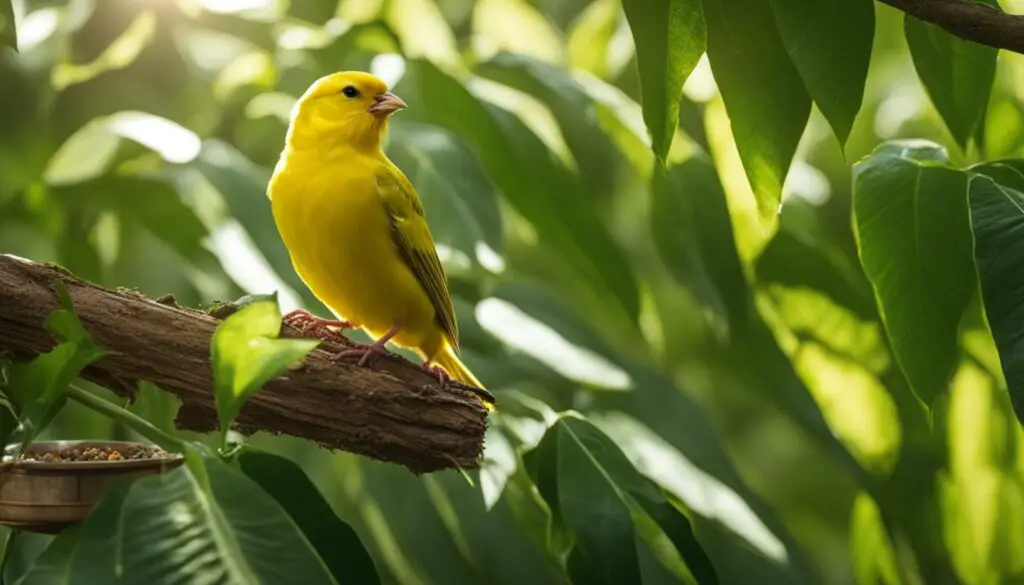Discover the ultimate guide to caring for your beloved canary with “The Complete Canary Care Guide.” Whether you’re a first-time canary owner or a seasoned bird enthusiast, this comprehensive handbook is your one-stop resource for all things canary-related. From bringing your canary home to creating a nurturing environment, this guide covers every aspect of canary care. It explores their natural behaviors, instincts, and personalities, and provides tips on finding the perfect canary and creating a healthy diet. Additionally, the guide offers techniques to train your canary to sing, enhance their vocalization, and keep them mentally stimulated. It also covers healthcare and preventive care for your canary’s well-being. Whether you’re a dedicated canary owner or simply curious about these beautiful birds, this guide will help you provide the best possible care for your feathered friend.
Key Takeaways:
- Understanding canary behaviors, instincts, and personalities is essential for creating a nurturing environment.
- Research and choose the right canary breed based on their characteristics and traits.
- Create an ideal living space for your canary with a spacious cage, appropriate perches, and environmental enrichment.
- Provide a balanced diet with high-quality pellets, fresh fruits and vegetables, and occasional treats.
- Train your canary to sing using various techniques and keep them mentally stimulated with interactive toys and activities.
The Fascinating World of Canaries: Natural Behaviors and Personalities
Canaries, with their vibrant plumage and enchanting melodies, have captivated bird enthusiasts for centuries. These delightful little birds are not only known for their singing abilities but also possess fascinating natural behaviors, instincts, and unique personalities. By understanding their behaviors and personalities, we can create a nurturing environment that caters to their specific needs.
Canaries engage in a range of captivating behaviors, from joyful hopping and graceful perching to meticulous grooming. These activities are not only a means of physical exercise but also help them express their natural instincts and maintain their well-being. Providing a spacious cage with different perches and toys encourages these natural behaviors and keeps them mentally stimulated.
Furthermore, each canary possesses its own distinct personality. Some canaries may be shy and reserved, while others are outgoing and active. By observing their behaviors and personality traits, we can better understand their preferences and tailor our care accordingly. Whether they enjoy interactive play or prefer a quieter environment, our canaries’ personalities guide us in providing the ideal living conditions and companionship they need to thrive.
Canaries are not just beautiful singers; they are fascinating creatures with unique behaviors and personalities. By creating an enriching environment and understanding their individual needs, we can ensure their well-being and enjoy a harmonious relationship with these beloved feathered friends.
| Canary Behaviors | Canary Personalities |
|---|---|
| Hopping | Shy and reserved |
| Perching | Outgoing and active |
| Grooming | Playful and curious |
By appreciating the natural behaviors and personalities of canaries, we can create an environment that promotes their overall well-being. From hopping and perching to grooming, canaries engage in activities that allow them to express their instincts and maintain a healthy balance. By observing our canaries closely, we can nurture their unique personalities and provide the care they need to lead happy and fulfilling lives.
Finding the Perfect Canary: Breed Selection and Purchasing
Choosing the right canary breed is an important decision that will impact your bird’s characteristics and appearance. Each canary breed has its own unique traits, such as size, color, and singing ability. Conducting thorough research and understanding the specific attributes of different breeds can help you make an informed choice when selecting your canary.
When it comes to purchasing a canary, it is essential to find a reputable source. Reputable bird breeders and pet stores that specialize in canaries are good options to consider. These sources have experience in breeding and caring for canaries, ensuring that the birds are healthy and well-socialized. It is important to avoid purchasing canaries from unknown or untrusted sources to prevent potential health issues or unethical breeding practices.
Buying a canary from a reputable source not only ensures the bird’s well-being but also provides you with the opportunity to ask questions and seek advice from experienced breeders. They can provide valuable insights into the specific care needs of the canary breed you choose, helping you create a suitable environment and provide proper care for your new feathered companion.
| Breed | Characteristics | Color Variations | Singing Ability |
|---|---|---|---|
| American Singer Canary | Small and lively birds, known for their exceptional singing abilities | Yellow, white, variegated | Excellent |
| Border Canary | Active and energetic birds with a melodious song | Yellow, green, white, variegated | Very good |
| Yorkshire Canary | Elegant and calm birds, appreciated for their soft song | White | Good |
Choosing the right canary breed is like selecting a unique companion with its own set of characteristics and talents. Researching different breeds and purchasing from reputable sources ensures that you find the perfect canary that will bring joy and melodic tunes into your life.
Mastering Canary Care: Creating an Ideal Living Space
Creating an ideal living space for your canary is essential for their well-being. The right cage setup and habitat can greatly contribute to their physical and mental health. Here are some key considerations to keep in mind:
Canary Cage Setup
When choosing a cage for your canary, opt for one that is spacious enough to allow them to move around comfortably. The cage should also have appropriate bar spacing to ensure that your canary cannot escape or get their head stuck between the bars. A minimum cage size of 18 inches long, 18 inches wide, and 24 inches high is recommended for a single canary.
Include perches of different sizes and materials to provide variety and exercise for your canary’s feet. Natural branches can be used as perches, as they offer a more textured surface for your canary to grip. Avoid using sandpaper-covered perches, as they can cause irritation and injury to your canary’s feet.
Canary Habitat
Choose a quiet area in your home to place the canary cage. This will help minimize stress and disturbances for your bird. Avoid placing the cage near drafty windows or areas with direct sunlight, as these can cause temperature fluctuations that can negatively affect your canary’s health.
Additionally, consider the surroundings of the canary cage. Keep it away from areas with heavy foot traffic or loud noises, as these can startle and stress your canary. Providing a calm and peaceful environment will contribute to your canary’s overall well-being.
Canary Environmental Enrichment
Environmental enrichment is crucial for keeping your canary mentally stimulated. Introduce a variety of toys in their cage, such as swings, bells, and puzzles. These toys can help prevent boredom and encourage your canary to engage in natural behaviors.
Offering natural branches for your canary to perch on not only provides exercise but also allows them to indulge in their natural instinct to chew. Replace the branches regularly to maintain cleanliness and prevent contamination.
Table: Canary Cage Setup Recommendations
| Aspect | Recommendation |
|---|---|
| Cage Size | Minimum 18 inches long, 18 inches wide, and 24 inches high for a single canary |
| Bar Spacing | Ensure the bars are spaced appropriately to prevent escape or injury |
| Perches | Include perches of different sizes and materials, avoiding sandpaper-covered perches |
| Cage Placement | Choose a quiet area away from drafts, direct sunlight, heavy foot traffic, and loud noises |
| Environmental Enrichment | Introduce a variety of toys and natural branches for mental stimulation |
Creating an ideal living space for your canary goes beyond choosing a cage. Taking into consideration the cage setup, habitat, and providing environmental enrichment will contribute to your canary’s overall happiness and well-being.

Optimal Diet and Nutrition: Providing Essential Nutrients
Proper diet and nutrition are crucial for ensuring the overall health and well-being of your canary. By providing your feathered friend with a balanced and nutritious diet, you can support their physical health and enhance their vitality. A well-rounded diet should consist of a combination of high-quality pellets or seed mixes, fresh fruits and vegetables, and occasional treats. This variety of foods ensures that your canary receives essential nutrients such as vitamins, minerals, and proteins.

| Food Group | Examples |
|---|---|
| Pellets or Seed Mixes | High-quality canary pellets, mixed seeds containing millet, sunflower seeds, and flaxseeds |
| Fruits and Vegetables | Fresh apples, carrots, leafy greens (spinach, kale), and broccoli |
| Treats | Small amounts of millet sprays, whole grain crackers, or dried fruits |
Water is also an essential component of your canary’s diet. Make sure that clean and fresh water is available to your canary at all times. Regularly clean and refill the water dish to maintain proper hygiene. Additionally, ensure that your canary’s food dishes are cleaned regularly. This prevents the buildup of bacteria and mold which can lead to health issues.
In addition to a healthy diet, consider providing your canary with dietary supplements specifically formulated for birds. These supplements can help bridge any nutritional gaps and promote optimal health. However, it’s important to consult with an avian veterinarian before introducing any new supplements to your canary’s diet to ensure they are safe and appropriate.
Unlocking Your Canary’s Singing Potential: Training Techniques
Training your canary to sing and enhancing their vocalization can be a rewarding experience. There are various training techniques you can use to help your canary unlock their singing potential and develop their melodic tunes. These techniques involve creating an environment that stimulates their natural instincts and providing positive reinforcement when they engage in vocalization.
One effective method is to play recordings of canary songs or whistling melodies. This can help stimulate your canary’s auditory senses and encourage them to mimic the melodies they hear. You can also try whistling or singing yourself, as canaries are known to pick up and imitate human sounds. Positive reinforcement, such as offering treats or praise, when your canary sings can reinforce the behavior and motivate them to continue vocalizing.
Spending quality time with your canary and engaging in social interaction can also encourage their singing abilities. Canaries are social birds, and the presence of their human companions can provide a sense of security and encouragement. Talking, singing, or whistling to your canary can create a bonding experience and motivate them to sing along. Experiment with different techniques and observe your canary’s response to find what works best for them.
| Training Technique | Description |
|---|---|
| Playing Canary Songs | Playing recordings of canary songs or whistling melodies to stimulate auditory senses and encourage singing. |
| Whistling or Singing | Whistling or singing yourself to provide examples for your canary to imitate. |
| Positive Reinforcement | Offering treats or praise when your canary sings to reinforce the behavior and motivate continued vocalization. |
| Engaging in Social Interaction | Talking, singing, or whistling to your canary to create a bonding experience and encourage singing. |
Remember, training your canary to sing takes time, patience, and consistency. It’s important to provide a nurturing environment that supports their natural instincts and allows them to express themselves. With dedication and love, you can unlock your canary’s singing potential and enjoy the beautiful melodies they bring to your home.
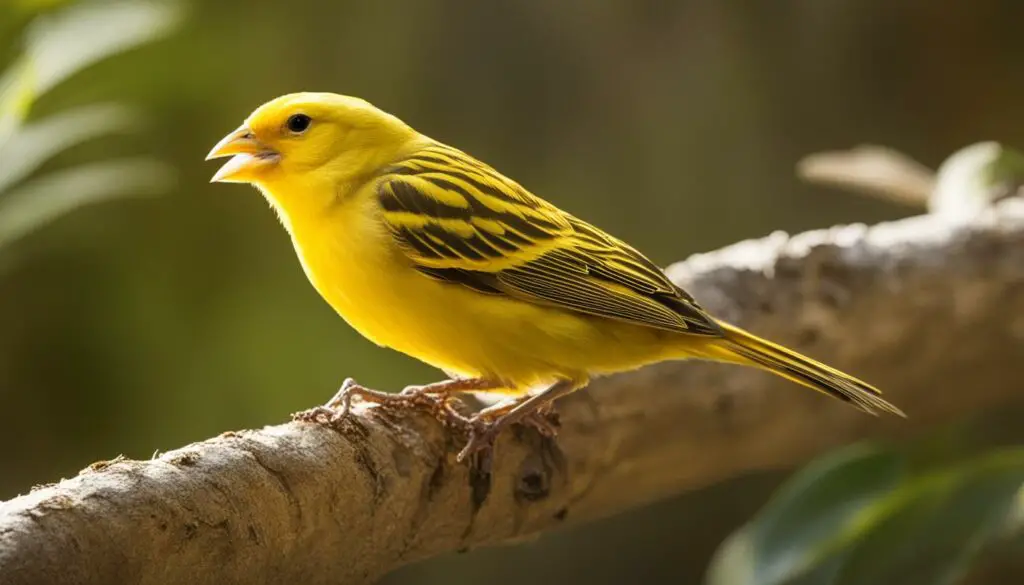
The Fascinating World of Canaries: Natural Behaviors and Personalities
Canaries are fascinating birds with a wide range of natural behaviors and unique personalities. Understanding these behaviors and personalities is key to providing them with the mental stimulation they need for a happy and healthy life. Let’s explore some of the most intriguing aspects of canary behavior:
The Melodious Singing:
One of the most notable behaviors of canaries is their melodious singing. Male canaries are renowned for their beautiful songs, which they use to communicate, attract mates, and establish territory. Through careful training and exercises, you can enhance your canary’s singing abilities. Singing exercises can include playing recordings of canary songs and whistling melodies for them to mimic.
Exploration and Play:
Canaries are active and curious birds. They love to hop around, explore their surroundings, and engage in play. Providing them with interactive toys, such as puzzle feeders and hanging swings, can keep them mentally engaged and prevent boredom. Canaries also enjoy flying in short bursts, so it’s essential to provide them with enough space to spread their wings.
Personality Traits:
Canaries have distinct personalities that can vary from bird to bird. Some canaries are bold and outgoing, while others may be shy and reserved. Observing your canary’s behavior and personality traits can help you tailor their care to their individual needs. For example, a shy canary may require a more peaceful environment, while an outgoing canary might enjoy more social interaction.
The Importance of Mental Stimulation:
Mental stimulation is vital for canaries to maintain their well-being. Along with singing exercises and playtime, you can provide mental stimulation through environmental enrichment. This can include offering a variety of perches, introducing new toys regularly, and creating opportunities for foraging. Mental stimulation not only keeps canaries happy but also helps prevent behavioral problems that can arise from boredom or stress.
I’m constantly amazed by the unique personalities and behaviors of canaries. It’s incredible to watch them sing, play, and explore their surroundings. By understanding their natural instincts and providing them with mental stimulation, we can ensure that our canaries live fulfilling lives.
In conclusion, canaries have a fascinating world of behaviors and personalities. From their melodious singing to their playful nature, canaries are truly captivating pets. By focusing on their mental stimulation and catering to their individual needs, we can create a nurturing environment for these beautiful birds.
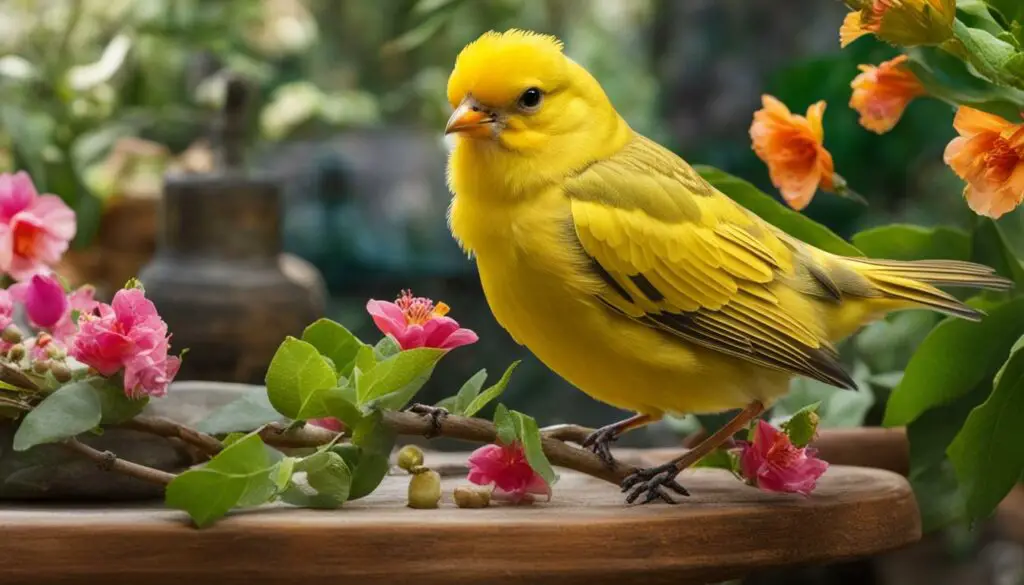
Ensuring Your Canary’s Health: Preventive Care and Medical Treatment
When it comes to caring for your canary, their health should always be a top priority. Implementing preventive care measures and seeking appropriate medical treatment is key to keeping your feathered friend happy and healthy.
To ensure the well-being of your canary, regular veterinary check-ups are essential. These check-ups help monitor your canary’s overall health and allow for the early detection of any potential issues. During these visits, your avian veterinarian can perform thorough examinations, conduct necessary tests, and provide guidance on maintaining your canary’s health.
In addition to regular check-ups, preventive care includes maintaining good hygiene in your canary’s living space. This entails keeping their cage clean and providing a safe and comfortable environment. Regular cleaning of food and water dishes, perches, and toys helps prevent the spread of bacteria and disease. It’s also important to offer appropriate medical treatments, such as vaccinations and parasite control, to protect your canary’s well-being.
Being aware of common health issues in canaries is crucial for early intervention. Respiratory infections and feather disorders are among the common concerns you need to watch out for. If you notice any signs of illness, such as difficulty breathing, changes in behavior, or abnormal feather growth, it’s important to seek veterinary help immediately.
| Common Health Issues in Canaries | Signs and Symptoms |
|---|---|
| Respiratory infections | Coughing, sneezing, difficulty breathing |
| Feather disorders | Abnormal feather growth, feather plucking |
| Parasite infestations | Excessive scratching, feather loss |
| Vitamin deficiencies | Weight loss, decreased energy |

Veterinary Care for Canary’s Well-being
Avian veterinarians are specialized in the care of birds, including canaries. They have the knowledge and experience to provide the best possible medical care for your canary. If you have any concerns about your canary’s health, it’s important to consult with a qualified avian veterinarian. They can offer guidance, diagnose any issues, and provide appropriate treatments.
Regular veterinary check-ups are essential for the health and well-being of your canary. These visits allow for early detection of potential health issues, ensuring prompt treatment and preventing further complications.
- Find a reputable avian veterinarian who has experience with canaries.
- Follow their recommendations for vaccinations and parasite control.
- Be observant of any changes in your canary’s behavior, appetite, or appearance.
- Seek veterinary help immediately if you notice any signs of illness.
By prioritizing preventive care and seeking appropriate medical treatment, you can ensure that your canary stays healthy and enjoys a long, happy life.
Caring for an Aging Canary: Signs of Aging and Senior Bird Care
As canaries age, it is important to be aware of the signs that indicate they may need additional care. While canaries are skilled at masking pain and discomfort, there are several common signs of aging to watch out for. These include decreased energy levels, mobility issues, changes in behavior, and weight loss. Recognizing these signs can help you provide the necessary support and care for your aging canary.
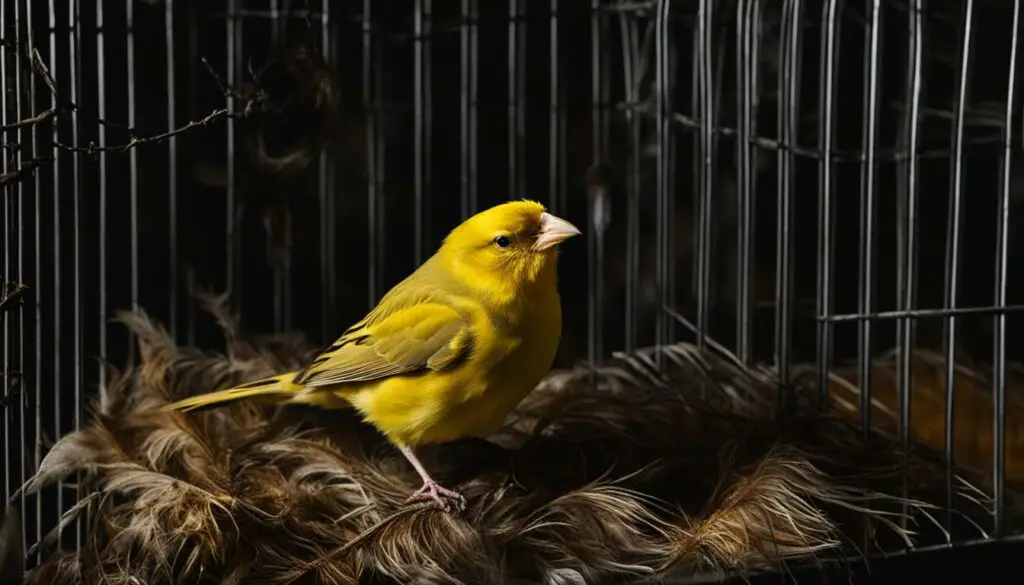
To ensure the well-being of your aging canary, adjustments should be made to their diet and living environment. Providing a warm and cozy space with soft perches will help minimize discomfort. Access to easily accessible food and water dishes is important to support their changing needs. Regular monitoring of their weight and overall condition will help you assess their comfort level and make any necessary accommodations.
Regular veterinary check-ups become even more crucial during this stage of your canary’s life. A qualified avian veterinarian can conduct thorough examinations, perform tests if necessary, and provide recommendations for maintaining your canary’s health and quality of life. Early detection and intervention can make a significant difference in the well-being of your aging canary.
| Signs of Aging in Canaries | Senior Bird Care Tips |
|---|---|
| Decreased energy levels | Provide a warm and cozy environment |
| Mobility issues | Offer soft and comfortable perches |
| Changes in behavior | Monitor weight and overall condition |
| Weight loss | Ensure easy access to food and water |
Creating Comfort for Your Aging Canary: Accommodations and Support
As your canary ages, it’s important to make accommodations to ensure their comfort and well-being. Just like humans, aging can bring physical and behavioral changes to our feathered friends. By providing the right accommodations and support, you can help your aging canary navigate this phase of their life with ease. Here are some tips to create a comfortable environment for your aging canary:
- Offer a warm and cozy environment: Aging canaries may be more sensitive to temperature changes. Make sure their living space is comfortably warm, especially during colder months.
- Provide soft and comfortable perches: Aging canaries may experience joint pain or mobility issues. Soft perches made of materials like fleece or soft rope can provide cushioning and support for their feet.
- Ensure easy access to food and water: Aging canaries may have difficulty reaching food and water dishes placed too high. Adjust the height of their perches and ensure easy access to sustain their nutritional needs.
Aging canaries may also benefit from extra attention and companionship. Spending quality time with your canary, gently handling them, and providing social interaction can bring comfort and emotional support to your furry friend. Remember to observe your canary closely and make necessary adjustments to their environment to ensure their comfort and well-being as they age.
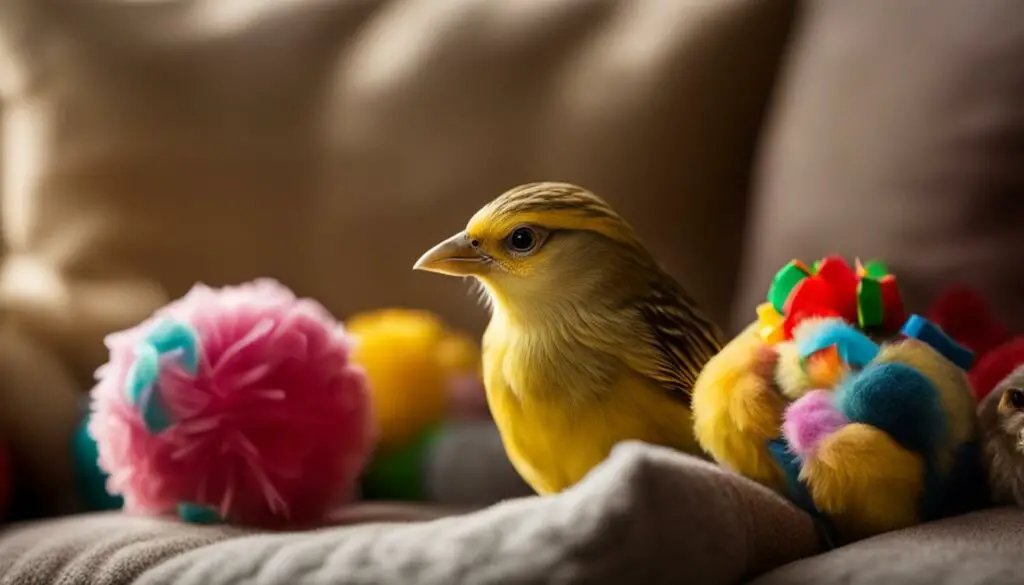
Supporting Your Aging Canary’s Health
As your canary ages, their health may require special attention. Regular veterinary check-ups become even more important to monitor their well-being and address any age-related health issues. Consult with an avian veterinarian who specializes in bird care to ensure your aging canary receives the best possible support.
During the check-up, the vet may recommend specific dietary changes or supplements to support your aging canary’s nutritional needs. They can also provide guidance on managing any age-related conditions that may arise, such as arthritis or respiratory issues. By staying proactive with your canary’s health, you can help them maintain a good quality of life well into their golden years.
Recognizing and Managing Pain in Aging Birds
The aging process can bring about discomfort and pain in birds, including canaries. Although canaries are adept at masking pain, it is crucial for bird owners to be vigilant and proactive in recognizing and addressing the signs of pain in their aging feathered friends. By understanding how to identify and manage pain, you can ensure the well-being and comfort of your beloved canary.
One of the key indicators of pain in aging canaries is a noticeable change in their behavior. They may become more withdrawn, display decreased activity levels, or show signs of irritability. Additionally, changes in appetite, weight loss, or alterations in grooming habits can be red flags. It’s essential to pay attention to any deviations from their usual patterns and seek veterinary care promptly if you suspect your canary may be in pain.
When it comes to managing pain in aging birds, consulting an avian veterinarian is crucial. They have the expertise to assess and diagnose the underlying cause of the pain, whether it’s related to arthritis, injury, or other age-related issues. The veterinarian may recommend pain management strategies such as medication, physical therapy, or changes in the bird’s environment to alleviate discomfort and improve their overall well-being.
Remember, early detection and intervention are key in managing pain in aging canaries. By staying attuned to your bird’s behavior, seeking veterinary care as needed, and following the recommended treatment plan, you can provide your aging canary with the support and relief they need to maintain a happy and comfortable life.
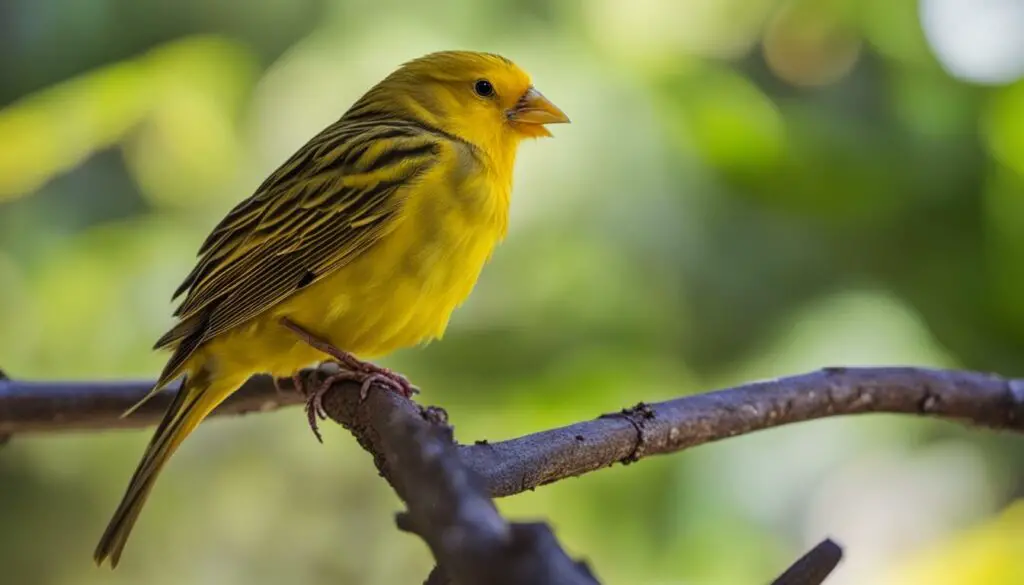
Table: Common Signs of Pain in Aging Canaries
| Signs of Pain | Description |
|---|---|
| Changes in Behavior | Withdrawn, increased irritability, decreased activity levels |
| Appetite Changes | Loss of appetite or changes in eating habits |
| Weight Loss | Unexplained weight loss despite normal food intake |
| Grooming Habits | Decreased grooming or changes in plumage condition |
Veterinary Care for Aging Canaries: When to Seek Help
As canaries age, their healthcare needs may change and require more attention. Regular veterinary care is essential to ensure their well-being. It’s important to be proactive and aware of the signs that may indicate a need for veterinary assistance.
Some common signs that your aging canary may require veterinary help include weight loss, decreased activity levels, changes in behavior, and difficulty breathing. If you notice any of these signs or any other unusual symptoms, it’s crucial to seek help from an avian veterinarian.
An avian veterinarian is specially trained to understand the unique needs and health issues that can arise in birds, including canaries. They can conduct a thorough examination, perform diagnostic tests if necessary, and develop a treatment plan specific to your canary’s needs.
Early detection and intervention are key to addressing health issues in aging canaries. Regular check-ups with an avian veterinarian can help catch any potential problems early on and ensure that your canary receives the appropriate care and treatment to maintain their health and quality of life.
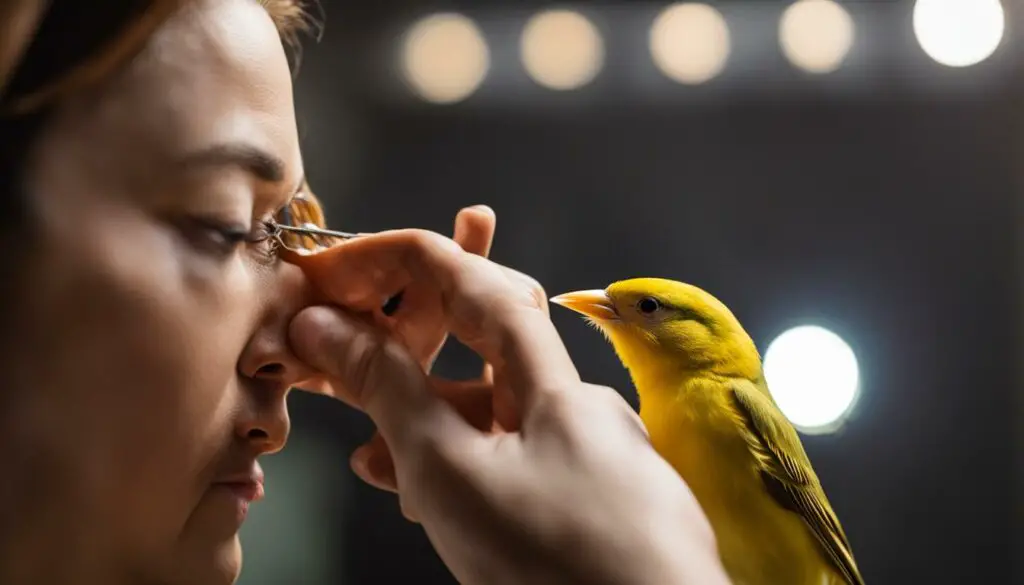
Table: Common Signs that may indicate the need for veterinary help
| Signs | Explanation |
|---|---|
| Weight loss | Can indicate underlying health issues such as malnutrition or metabolic disorders. |
| Decreased activity levels | May be a sign of pain, discomfort, or chronic illness. |
| Changes in behavior | Unusual behaviors or personality changes may indicate a need for medical attention. |
| Difficulty breathing | Can be a symptom of respiratory infections or other respiratory conditions. |
“Regular check-ups with an avian veterinarian can help catch any potential problems early on and ensure that your canary receives the appropriate care and treatment to maintain their health and quality of life.”
Remember, as your canary ages, their healthcare needs may change. Providing regular veterinary care and seeking help when needed is crucial for ensuring a happy and healthy life for your aging canary.
Conclusion
In conclusion, caring for a canary requires diligent attention to their unique needs and behaviors. By following the techniques and practices outlined in this guide, I can provide optimal care for my beloved canary. From creating an ideal living space to training them to sing and ensuring their health as they age, every aspect of canary care plays a crucial role in their overall well-being.
Regular veterinary check-ups, close observation, and adaptability to their changing needs are key to ensuring a happy and fulfilling life for my canary. By implementing these strategies, I can unlock their singing potential and strengthen the bond I share with my feathered friend.
With dedication, love, and the knowledge gained from “The Complete Canary Care Guide,” I am confident that I can provide the best possible care for my canary. By understanding their natural behaviors, choosing the right breed, creating a nurturing environment, and providing a balanced diet, I can ensure my canary’s optimal health and vitality. Furthermore, by engaging in training techniques and offering mental stimulation, I can enhance their singing abilities and keep them mentally sharp.
Lastly, as my canary ages, I will continue to monitor their health, make necessary accommodations for their comfort, and seek veterinary care when needed. By recognizing the signs of aging, managing pain, and providing emotional support, I can ensure a high quality of life for my aging canary. By consistently following these practices, I can create a harmonious and fulfilling relationship with my feathered companion for years to come.
FAQ
What should I feed my canary?
Canaries require a balanced diet consisting of high-quality pellets or seed mixes, fresh fruits and vegetables, and occasional treats. Providing a variety of foods ensures they receive essential nutrients.
How can I train my canary to sing?
Training your canary to sing can be achieved through techniques such as playing recordings of canary songs, whistling melodies, and providing positive reinforcement when your canary sings.
How do I keep my canary mentally stimulated?
Keeping your canary mentally stimulated can be done through interactive toys, puzzles, and activities that mimic their natural behaviors. It’s important to regularly introduce new toys to prevent boredom.
When should I seek veterinary care for my canary?
Regular veterinary check-ups are essential for monitoring your canary’s overall well-being. If you notice any signs of decline in their health, such as weight loss or changes in behavior, it’s important to seek veterinary help.
How do I create a comfortable environment for my aging canary?
Creating a comfortable environment for your aging canary can include providing a warm and cozy space, soft and comfortable perches, and ensuring easy access to food and water.
How can I recognize pain in my aging canary?
Aging canaries may experience chronic pain, but they are skilled at masking it. Signs that may indicate pain include changes in behavior, appetite, or grooming habits. If you suspect pain, seek veterinary care.
When should I seek veterinary care for my aging canary?
If you notice any signs of decline in your aging canary’s health, such as weight loss or decreased activity, it’s important to seek help from an avian veterinarian for a thorough examination and appropriate recommendations.

